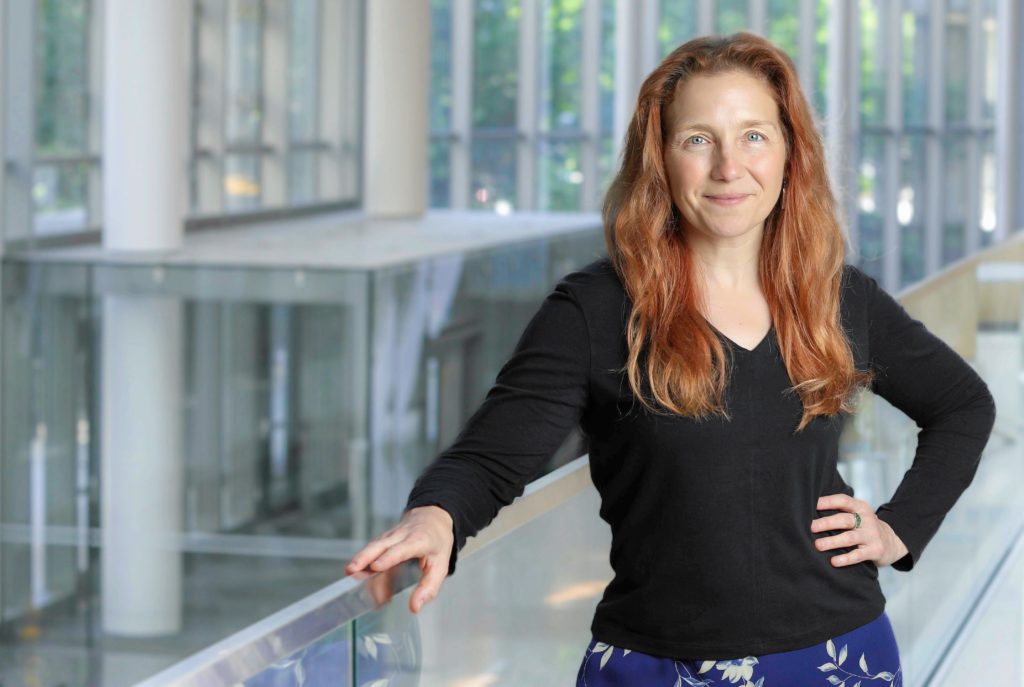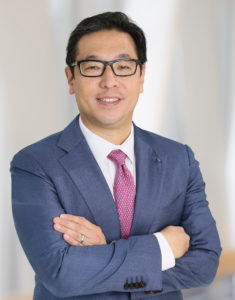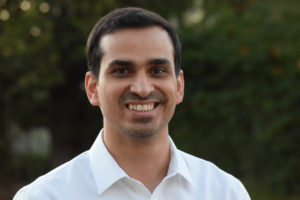This story was originally published as part of the November 2024 issue of the Breakthroughs newsletter.
Just two years out from its launch, the Center for Human Immunobiology (CHI) has quickly become a bustling hub for collaborative efforts to understand the molecular mechanisms of the immune system and translate discoveries into innovative cures for immune-regulated diseases.
Led by Stephanie Eisenbarth, MD, PhD, chief of allergy and immunology, the CHI has grown to include more than 160 faculty, more than 100 trainees and 12 staff members.

“It’s been amazing to see the growth,” Eisenbarth said. “It’s clear that the Northwestern immunology community has been galvanized.”
Bringing the immunology community together had been one of Eisenbarth’s main goals, she said, because this type of research requires close interdisciplinary collaboration.
Trainees are encouraged to discuss research in progress at Immunology Discussion Club meetings. The CHI is also creating a specialized curriculum for those interested in immunology to get hands-on experience and learn the latest techniques.
Faculty within the center are organized in working groups, each with a different focus – such as immunometabolism, innate immunity, adaptive immunity, mucosal immunology or biomedical informatics – to share ideas and expertise.
“The point of these working groups is to bring faculty together who might not know each other to advance each other’s science,” and launch synergistic projects, Eisenbarth said.
The close collaboration has paid off, Eisenbarth said. The CHI was recently designated a Center of Excellence by the Federation of Clinical Immunology Societies, a number of large NIH-supported grants were awarded to working group collaborations and an abundance of high-impact research publications have been published with help from the center.
Uncovering the Mysteries of the Immune System
In a study published in Mucosal Immunology, Eisenbarth and Adam Williams, PhD, associate professor of Medicine in the Division of Allergy and Immunology, who were co-senior authors of the publication, shed new light on the mechanisms that promote production of IgA antibodies in the gut in response to food allergens.
The gut’s mucosal tissue, which comprises the inner lining of the intestinal tract, and mucosal antibodies, specifically Immunoglobulin A, or IgA, help the gut control bacteria and neutralize toxins. However, little is understood about what IgA to food actually does in the gut and how it is induced.
The discovery improves the understanding of how B-cells operate within the gut and how these cells generate antibody responses to food. The findings may also help explain why patients with certain genetic mutations are more susceptible to gastrointestinal infections and could inform new therapeutic strategies that involve maintaining IgA-secreting plasma cells in the gut.

Other investigators within the CHI have offered innovative new therapies for fighting cancer. In a publication in Nature, Northwestern Medicine scientists detailed a new method to minimize the limitations of engineered T-cells by borrowing a few tricks from cancer itself.
By studying mutations in malignant T-cells that cause lymphoma, investigators led by CHI member Jaehyuk Choi, MD, PhD, associate professor of Dermatology and of Biochemistry and Molecular Genetics, zeroed in on one that imparted exceptional potency to engineered T-cells. Inserting a gene encoding this unique mutation into normal human T-cells made them more than 100 times more potent at killing cancer cells without any signs of becoming toxic.
Other CHI investigators have uncovered how antibody responses are regulated by epigenetic factors that are commonly mutated in cancers. In a study published in Nature Immunology, Vipul Shukla, PhD, assistant professor of Cell and Developmental Biology, and his collaborators offered new insights into how modulating inflammatory responses could be useful in treating cancers with mutations in complexes that regulate DNA structure.

“One of the most important findings from our study was the fact that uncontrolled inflammation can have paradoxical effects on inhibiting adaptive immune responses,” Shukla said. “These findings attest and add to an emerging conceptual paradigm in immunity, which highlights that unrestricted inflammation could dictate the quality of the adaptive immune response.”
Eisenbarth, Choi and Shukla are also members of the Robert H. Lurie Comprehensive Cancer Center of Northwestern University.
Research publications from the CHI have helped to uncover the mechanisms behind immune responses to a variety of diseases, Eisenbarth said, and additional research powered by new grants is on the way.
New Grants and Funding Opportunities to Empower Discoveries
The food allergy-focused mucosal immunology working group within the CHI was recently awarded one of eleven Consortium for Food Allergy Research (CoFAR) grants nationally, led by Cecilia Berin, PhD, the Bunning Professor of Food Allergy Research and Ruchi Gupta, MD, MPH, professor of Pediatrics, of Medicine and of Preventive Medicine, and director of the Center for Food Allergy and Asthma, to conduct groundbreaking clinical research on food allergy prevention and therapy and on the biological mechanisms underlying food allergies.
“This is the first time Northwestern has been part of this consortium, which is exciting as we will participate in a national clinical trial,” Eisenbarth said. “We have a really exciting, cutting-edge research angle to the study as well, which is unique just to the Northwestern site, and that’s to understand some of the cells that mediate and drive food allergy. If we understand them, that helps us learn how to redirect them and hopefully cure food allergy.”
In addition to allergy research, several new grants and initiatives launched under the CHI aim to expand the understanding of immune responses in a wider variety of diseases, Eisenbarth said.
“There’s been a revolution in immunology over the last two decades and it’s become clear that the immune system either causes or regulates almost every disease, whether it’s atherosclerosis, allergy, transplant rejection, infection or cancer,” Eisenbarth said.
One of the new grants — “The Neu-Lung Consortium: Neutrophilic Mechanisms of Inflammation, Injury and Repair in Lung and Airways Diseases” — is part of the National Institute of Allergy and Infectious Diseases’ U19 Cooperative Centers in Human Immunology.
Northwestern is one of nine sites chosen for this award. The grant is led by Eisenbarth, Benjamin Singer, ’07 MD, ’10 GME, an associate professor of Medicine in the Division of Pulmonary and Critical Care and Alexander Misharin, MD, PhD, associate professor of Medicine in the Division of Pulmonary and Critical Care and a member of the Lurie Cancer Center.
The $12 million grant given by the National Institutes of Health will fund studies to identify mechanisms that determine how lung neutrophils – first-responder immune cells – drive tissue injury, inflammation and repair in patients with severe pneumonia, lung transplantation and asthma.
“Although these conditions sound pretty disparate, they actually have some interesting commonalities,” Eisenbarth said. “By studying all three in a more holistic way, we can really understand how this particular population of cells causes lung damage.”
Funding is also available for Feinberg investigators looking to launch innovative immunobiology research projects. The CHI pilot award offers $100,000 to interdisciplinary projects led by Feinberg investigators who are members of the CHI who might not otherwise have the chance to collaborate.
The first pilot award was given to a team focusing on mitochondrial disorders impacting the immune system and the second to a team aiming to disrupt the tumor microenvironment in glioblastoma, Eisenbarth said.
“The awards have already brought together some amazing scientists with complementary expertise and it’s something that we hope to continue on a yearly basis,” Eisenbarth said.
“We’ve learned so much about the immune system that has enabled completely out-of-the-box therapies. We’re now starting to see the impact of harnessing the immune system to fight diseases like cancer and that’s only going to get more diverse and more powerful.”
Food allergies will also continue to be an exciting area of investigation, Eisenbarth said.
“We are learning a ton about the fundamental aspects that drive allergic response to food, which has been a mystery for a long time. With our working group, we’re tackling this from every angle,” she said. “We are going to have a new understanding and new approaches to try to treat and even reverse food allergies. I’m super excited about what’s on the horizon.”






